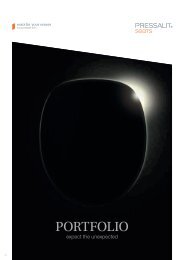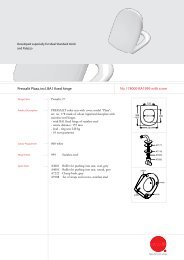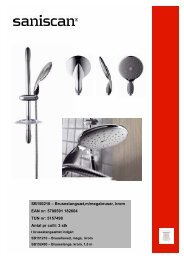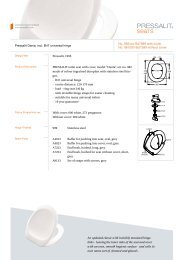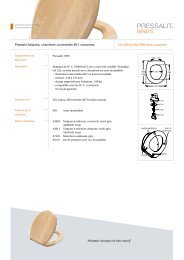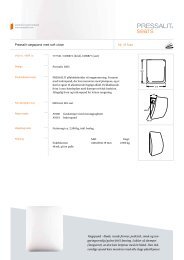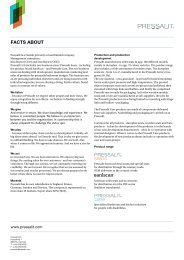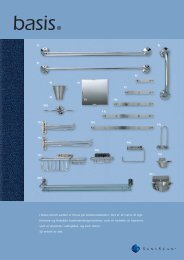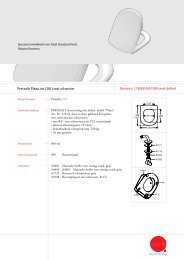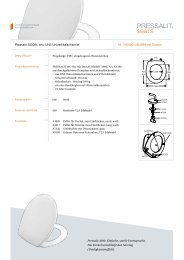better - Pressalit A/S
better - Pressalit A/S
better - Pressalit A/S
You also want an ePaper? Increase the reach of your titles
YUMPU automatically turns print PDFs into web optimized ePapers that Google loves.
achieved by means of a ”yo-yo procedure”, whereby expedition<br />
members climb a short distance up the mountain,<br />
gradually acclimatise to the lower oxygen content<br />
– and then climb back down a little. The next day the<br />
person climbs a little higher before repeating the whole<br />
procedure. And so it continues – until – they hopefully<br />
reach the summit. In their battle against the lack of<br />
oxygen, a strong mental attitude plays a vital role, and<br />
with his wealth of experience from elite sport, Cato Zahl<br />
truly has something valuable to offer the other expedition<br />
members.<br />
To be a “storyteller” – a teller of stories – from the<br />
summit is another personal goal. Reaching the summit<br />
will in itself be a story about our inability to judge a<br />
book by its cover, or functional ability and performance<br />
simply by looking at a person, and that other people<br />
who are slightly different from the norm possess a<br />
greater potential than we often expect. This is a message<br />
that Cato Zahl would very much like to hammer<br />
home to the welfare society, the labour market and to<br />
individuals in general. Personally, he views Cho Oyu as<br />
a learning opportunity - for the expedition will reveal<br />
the boundary of his own limitations.<br />
Functional ability and limitations<br />
Do you never stop to think about the risks involved in<br />
such an expedition?<br />
”People have told me that the expedition is a foolhardy<br />
undertaking. That it’s too dangerous for me. They said<br />
the same thing about our expedition to the South Pole.<br />
But in reality, there is no danger in what we’re doing.<br />
Crossing a busy road at the wrong place – can prove<br />
deadly, but our expedition is not inherently dangerous<br />
because we are constantly aware of safety issues. We<br />
spend the necessary time to ensure extra safety for<br />
me. Outside factors such as the weather, sickness and<br />
accidents can pose a threat but we can greatly reduce<br />
the risk through proper planning. The expedition team<br />
comprises top professional, well-prepared members<br />
and in Nepal we have allied ourselves with one of the<br />
world’s top sherpas, Dawa Chiri Sherpa, who will act as<br />
a guide and help assemble a local team to aid in carrying<br />
the equipment. So we have done what we can to<br />
give ourselves optimal climbing conditions.”<br />
How can you approach such a difficult task without<br />
focusing on limitations?<br />
”Your question goes to the very heart of the whole issue<br />
of functional ability and performance. Many people<br />
have a tendency to become bogged down by limitations<br />
and to view them as an insurmountable problem, which<br />
triggers a general feeling of despair in relation to task<br />
solving. We’re quick to call something difficult. I have<br />
had to realise that the more accurately I can describe<br />
a limitation, the easier it is to overcome it. It’s about<br />
“giving a name to the problem” – about dismantling the<br />
obstacle and breaking it down into its concrete subelements<br />
so we can see what is needed to solve each<br />
separate element. For example, there is nothing difficult<br />
about walking to the South Pole – all you have to do<br />
is find your direction and start walking. Physically it is<br />
exhausting, but that’s something entirely different. But<br />
it’s not – difficult.”<br />
While I am chewing this over, Cato Zahl continues:<br />
”Sometimes you fight a lack of motivation because<br />
you’re cold, tired or disheartened. Then the only option<br />
is to step back and try to assess the situation: - What<br />
exactly is the problem? Maybe you’re freezing to the<br />
bone. - Okay, what can I do about that? Have I got an<br />
extra pair of trousers in my rucksack? - Okay, would it<br />
be a good idea to put them on? In this way, you gradually<br />
break down a general limitation into specific things<br />
that are limiting your ability to function.”<br />
Keep Living<br />
As a physically impaired person, Cato Zahl is used to<br />
relying on auxiliary aids to compensate for his physical<br />
limitations. The prosthesis attached to his right arm<br />
is literally vital when he has to suspend himself from<br />
a climbing rope on the mountain face. Perhaps it is<br />
this ability to find concrete solutions to problems that



